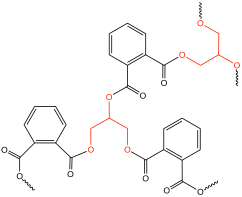An alkyd is a polyester resin modified by the addition of fatty acids and other components.[1] Alkyds are derived from polyols and organic acids including dicarboxylic acids or carboxylic acid anhydride and triglyceride oils. The term alkyd is a modification of the original name "alcid", reflecting the fact that they are derived from alcohol and organic acids.[2] The inclusion of a fatty acid confers a tendency to form flexible coatings. Alkyds are used in paints, varnishes and in moulds for casting. They are the dominant resin or binder in most commercial oil-based coatings. Approximately 200,000 tons of alkyd resins are produced each year.[3] The original alkyds were compounds of glycerol and phthalic acid sold under the name Glyptal.[4] These were sold as substitutes for the darker-colored copal resins, thus creating alkyd varnishes that were much paler in colour. From these, the alkyds that are known today were developed.

- ^ "Alkyd Resins", Polymer Syntheses, Organic Chemistry, vol. 29, Elsevier, 1977, pp. 140–170, doi:10.1016/b978-0-12-618502-7.50010-6, ISBN 978-0-12-618502-7, retrieved 2021-05-14
- ^ Elliott, W. T. (1993), "Alkyd Resins", Surface Coatings: Volume 1 Raw Materials and Their Usage, Dordrecht: Springer Netherlands, pp. 76–109, doi:10.1007/978-94-011-1220-8_5, ISBN 978-94-011-1220-8, retrieved 2021-05-14
- ^ Frank N. Jones. "Alkyd Resins". Ullmann's Encyclopedia of Industrial Chemistry. Weinheim: Wiley-VCH. doi:10.1002/14356007.a01_409. ISBN 978-3527306732.. Published online: 15 January 2003.
- ^ "Properties of Alkyd Resins". polymerdatabase.com. Retrieved 2021-05-14.